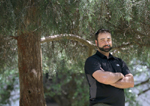|
It would seem
the benefits of diversity on
campus apply not just to people.
They include the tree kingdom as
well.
An initiative
to make MUSC an arboretum begins
April 27 with a celebration of
Arbor Day. The idea is to spend
the next year until Arbor Day 2013
planting diverse native species
that will create an urban forest
on campus, enabling MUSC to become
the fifth campus in the state to
be designated a Tree Campus USA by
the National Arbor Day Foundation.
MUSC will join the ranks of
Clemson, Furman and the University
of South Carolina's Columbia and
Upstate campuses.
 Nate Dubosh in the
Horseshoe, a favorite picnic
spot because of all the shade
trees. Everyone on the grounds
crew is supportive of each other
and does a great job keeping the
campus beautiful, he said. Nate Dubosh in the
Horseshoe, a favorite picnic
spot because of all the shade
trees. Everyone on the grounds
crew is supportive of each other
and does a great job keeping the
campus beautiful, he said.
In honor of the
event, Nate Dubosh, MUSC's
certified arborist, will teach
people how to properly plant and
care for South Carolina-native
trees at noon behind the Darby
Children's Research Institute.
A strong
proponent of the movement is Jerry
Reves, M.D., Distinguished
University Professor and dean
emeritus, College of Medicine, who
said the move complements the city
of Charleston being a Tree City
USA community.
"We have an
opportunity to promote the health
and growth of our native species
of plants and trees in an urban
setting to support the city's
efforts, all while promoting
health and teaching the community
and MUSC family members about
these species. Becoming an
arboretum is simply part of being
a first-rate campus."
Dubosh is
heading up the initiative, which
will focus on increasing the
diversity of trees on campus. The
campus has about 65 different
species with plans to increase
that number to 200. Having a
diversity of species offers more
biodioversity and resistance to
diseases, he said.
Dubosh and his
colleagues are working on a master
landscape plan for the campus,
ensuring the holistic integration
of the arboretum into the overall
campus facilities planning
including landscape planning and
maintenance efforts. An overall
goal of this effort is to serve as
an example of the best in urban
forestry planning and construction
to inspire other local communities
to adopt and implement these
practices.
Campus trees
will be identified, protected and
included in a dynamic electronic
inventory available to the public
through an interactive website
that will catalogue each tree and
provide the basis for its care and
maintenance. Scannable QR tag
codes will be placed on trees to
turn the campus into a living
museum of botanical offerings.
Varied native vegetation supports
the mission to educate people
about trees and plants unique to
the Lowcountry.
Dubosh said the
arboretum ties in nicely with
ongoing plans for a medicinal
garden, an educational tool for
students and visitors. Other plans
include designating a spot for a
small fruit orchard and possibly a
children's garden.
Urban forest areas improve the
environment in a wide range of
ways, from the improvement of air
quality to encouraging people to
be outdoors and exercise more.
Another benefit is research that
shows patients require less
medication and recover faster when
allowed access to or views of
forest areas, he said.
In Japan,
researchers have long studied what
they call 'forest bathing,' a
concept that appeals to Dubosh.
They have found that a walk in the
woods can reduce the level of
stress chemicals in the body and
increase natural killer cells in
the immune system, which fight
tumors and viruses. Studies in
inner cities show that anxiety,
depression and even crime are
lower in a landscaped environment
and that children with ADHD seem
calmer when they increase the time
spent outdoors.
Having enjoyed
earning his arborist certification
in the past year, Dubosh said he
can't stop himself from noticing
trees now. "It's a curse," he
said, smiling. "I'm driving around
and I see what's wrong with this
tree and what's right with
another. There are so many things
I like about trees – their
timelessness – how they'll be here
long after we're gone."
He loves his job, which has him
outdoors 90 percent of the time,
often up in a tree. He appreciates
that he gets to see the campus
from a perspective that no else
gets to experience. Glad that more
trees will be taking root on
campus, Dubosh said it reminds him
of one of his favorite proverbs.
"The best time
to plant a tree is 20 years ago.
The second best time is today."
Want
to contribute?
Anyone who wishes to contribute to
the arboretum project, can donate
through MUSC's Yearly Employee
Support (YES) Campaign. Visit https://giving.musc.edu/yes
and click on Make a Gift.
For information
on the campaign, call the Office
of Development at 792-4275 or
Whitney McLuen at 792-1973. McLuen
alsomay be reached at
mcluen@musc.edu.
|



 Nate Dubosh in the
Horseshoe, a favorite picnic
spot because of all the shade
trees. Everyone on the grounds
crew is supportive of each other
and does a great job keeping the
campus beautiful, he said.
Nate Dubosh in the
Horseshoe, a favorite picnic
spot because of all the shade
trees. Everyone on the grounds
crew is supportive of each other
and does a great job keeping the
campus beautiful, he said.